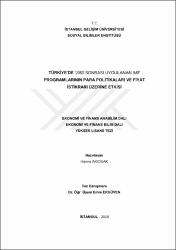| dc.contributor.author | Akcısak, Havva | |
| dc.date.accessioned | 2019-12-20T21:06:08Z | |
| dc.date.available | 2019-12-20T21:06:08Z | |
| dc.date.issued | 2019 | en_US |
| dc.date.submitted | 2019-06-20 | |
| dc.identifier.uri | https://hdl.handle.net/11363/1554 | |
| dc.description | Danışman: DR. ÖĞR. ÜYESİ EMRE ERGÜVEN
Yer Bilgisi: İstanbul Gelişim Üniversitesi / Sosyal Bilimler Enstitüsü / Ekonomi Finans Anabilim Dalı / Ekonomi Bilim Dalı
Konu: Ekonomi = Economics | en_US |
| dc.description.abstract | Türkiye ekonomisi uzun yıllar yüksek enflasyon, ödemeler dengesi sorunu ve finansal problemlerle yaşamış, bunun neticesinde kuruluşu itibari ile üye olduğu IMF tarafından desteklenen programlar uygulanmıştır.Uygulanan bu programlar temelde, yüksek enflasyon oranlarını ve buna bağlı olarak ortaya çıkan kamu mali açıklarını azaltmayı hedefleyen önlemleri kapsamaktadır.Bu çalışmada özellikle 1980' den sonra IMF desteği ile uygulamaya alınan programların para politikaları ve fiyat istikrarına etkisi üzerinde durulmuştur.Ekonomide uzun yıllar gözlenen yüksek enflasyon neticesinde uygulamaya alınan para politikaları enflasyona düşürmeye yönelik olmuştur. 1980 yılı itibari ile başlayan dışa dönük progrmların para politikası uygulamaları ve zaman içerisindeki değişimi ele alınmıştır. Yıllarca fiyatlar genel düzeyinde istikrar sağlanamamış ve IMF'den bu sorunu çözebilmek için destek istenmiştir. 1999 yılında Enflasyon ile Mücadele Programı kapsamında enflasyon oranının düşürülmesi üzerine kararlar alınmış ve enflasyon oranında düşüş gözlenmiş fakat ciddi anlamda döviz sıkıntısı yaşanmış, Türk lirası aşırı değerlenmiştir. Bunun neticesinde IMF destekli programın uygulandığı dönemde Türkiye krize sürüklenmiştir. Mevcut program daha fazla sürdürülememiş ve sonlandırılmıştır. Fiyat istikrarını sağlamada 2002 yılı öncesi uygulamaya alınan istikrar programlarında başarı sağlanamamıştır. Fiyat istikrarını sağlamada parasal ve döviz kuru hedeflemeleri gibi uygulanan politikalarının başarısızlıkla sonuçlanması modern ekonomilerin uyguladığı yöntem olan enflasyon hedeflemesi rejimine geçişe neden olmuştur. Türkiye ekonomisinde fiyat istikrarını sağlamada 2002-2006 yılları arasında örtük, 2006 yılı itibari ile de açık enflasyon hedeflemesi uygulamasına geçilmiş ve bu uygulamaya devam edilmiştir. | en_US |
| dc.description.abstract | Turkey's economy for many years of high inflation, balance of payments problems and financial problems experienced with, programs supported by the IMF as a result of which it is a member since the organization was applied. These programs mainly cover measures aimed at reducing high inflation rates and related public financial deficits. In this study, the effects of the programs implemented with IMF support on monetary policies and price stability are emphasized. As a result of the high inflation observed in the economy for many years, the monetary policies implemented were aimed at reducing inflation. Monetary policy applications of extroverted programs beginning in 1980 and the change in time have been discussed. For years, the general level of prices has not been stabilized and support has been sought to solve this problem from IMF. Decisions were taken to reduce the inflation rate within the scope of the Program on Combating Inflation in 1999 and inflation was observed to decline, but there was a significant foreign exchange shortage, and the Turkish lira was over-valued. As a result, the period of implementation of the IMF-supported program, Turkey has been dragged into the crisis. The current program could not be further maintained and terminated. In order to ensure price stability, the stability programs implemented before 2002 were not successful. In order to ensure price stability, the failure of the implemented policies such as monetary and exchange rate targets resulted in the transition to the inflation targeting regime, which is the method applied by modern economies. Implicit inflation targeting between 2002-2006 used in maintaining price stability in Turkey's economy and since 2006 has been adopted explicit inflation targeting application and this continued to be implemented. | en_US |
| dc.language.iso | tur | en_US |
| dc.publisher | İstanbul Gelişim Üniversitesi Sosyal Bilimler Enstitüsü | en_US |
| dc.rights | info:eu-repo/semantics/openAccess | en_US |
| dc.rights | Attribution-NonCommercial-NoDerivs 3.0 United States | * |
| dc.rights.uri | http://creativecommons.org/licenses/by-nc-nd/3.0/us/ | * |
| dc.subject | IMF Programları | en_US |
| dc.subject | Para Politikası | en_US |
| dc.subject | Enflasyon Hedeflemesi | en_US |
| dc.subject | Fiyat İstikrarı | en_US |
| dc.subject | IMF Programs | en_US |
| dc.subject | Monetary Policy | en_US |
| dc.subject | Inflation Targeting | en_US |
| dc.subject | Price Stability | en_US |
| dc.title | Türkiye'de 1980 sonrası uygulanan IMF programlarının para politikaları ve fiyat istikrarı üzerine etkisi | en_US |
| dc.title.alternative | The effect of IMF programs implemented after 1980 on monetary policies and price stability | en_US |
| dc.type | masterThesis | en_US |
| dc.department | Sosyal Bilimler Enstitüsü | en_US |
| dc.relation.publicationcategory | Tez | en_US |



















